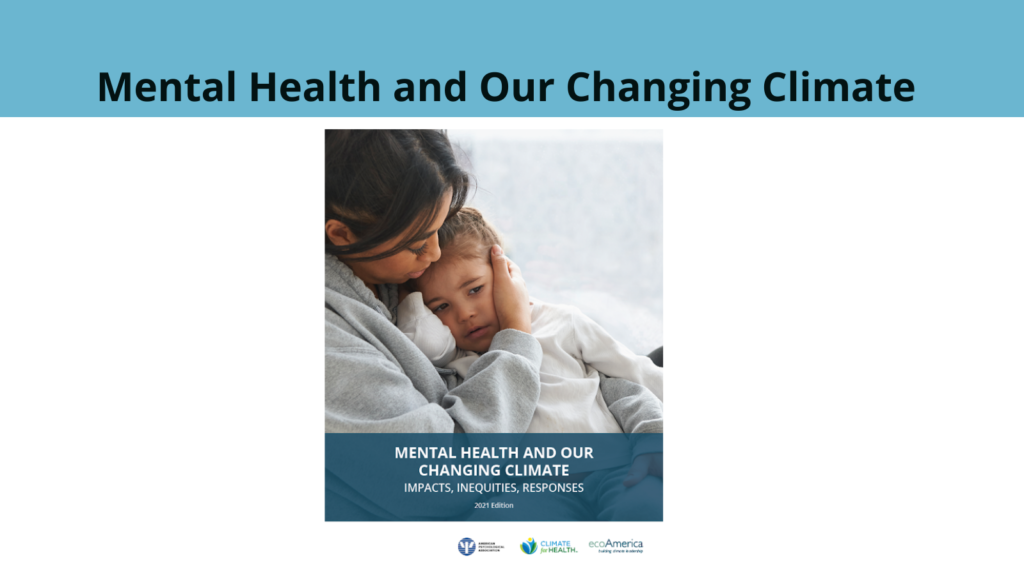With a large majority of Americans concerned about climate change and an increasing number expressing alarm and distress, it is past time to address this burgeoning public health crisis at the individual, community and societal levels, according to a report from the American Psychological Association and ecoAmerica.
“Our climate is changing at an unprecedented and alarming rate with profound impacts on human life,” said the report, entitled, “Mental Health and Our Changing Climate: Impacts, Inequities, and Responses.” “Climate change-fueled acute disaster events are causing deleterious impacts on human health. Longer term climate change leads to temperature-related illness and mortality, spread of vector-borne disease, respiratory issues and allergic response, compromised fetal and child development, and threats to water and food supply and safety — among other impacts.”
The effects of climate change on humans, however, go beyond physical health.
“Climate change is one of the most crucial issues facing our nation and the world today, and it is already taking a huge toll on the mental health of people around the globe,” said APA CEO Arthur C. Evans Jr., PhD. “Psychology, as the science of behavior, will be pivotal to making the wholesale changes that are imperative to slow – and, we hope, stop – its advance.”
The report, an update to a 2017 report also issued by APA and ecoAmerica, is intended to inform and empower health and medical professionals, community and elected leaders and the public to pursue solutions to climate change that will support mental health and well-being. This is particularly important as world leaders proceed with climate negotiations at COP26, the United Nations Climate Change Conference.
Over three-quarters of Americans report that they are concerned about climate change, and about 25% say they are “alarmed,” nearly double the percentage who reported feeling alarm in 2017, according to the latest report.
The most immediate effects on mental health can be seen in the aftermath of increasing disaster events fueled by climate change, such as hurricanes, wildfires and floods. These effects can include trauma and shock, post-traumatic stress disorder, feelings of abandonment, and anxiety and depression that can lead to suicidal ideation and risky behavior. At the community level, these disasters can strain social relationships, reduce social cohesion and increase interpersonal violence and child abuse.
In the long term, climate change has equally profound mental health impacts. Rising temperatures can fuel mood and anxiety disorders, schizophrenia and vascular dementia, and can increase emergency room usage and suicide rates, according to the report. Changes in the local environment can cause grief, disorientation and poor work performance, as well as harm to interpersonal relationships and self-esteem. People displaced by climate change events, such wildfires or droughts, can experience loss of personal identity, among other more severe impacts. Ultimately, mass migrations spurred by long-term climate change can lead to intergroup hostilities, political conflicts, terrorism and even war.
Concern about climate change coupled with worry about the future can lead to fear, anger, feelings of powerlessness, exhaustion, stress and sadness, often referred to as “eco-anxiety” or “climate anxiety.” Studies indicate this anxiety is more prevalent among young people; it has been linked to increases in substance use and suicidal ideation.
The destructive effects of climate change are likely to fall disproportionately on communities that are already disadvantaged by historic and current social, economic and political oppression. For example, discriminatory housing policies, such as redlining and racially restrictive covenants, mean that people of color are significantly more likely to live in areas prone to risk. Indigenous people, children, older adults, women, people with disabilities or existing mental health conditions, and outdoor workers are additional groups that may be more prone to mental health difficulties from a changing climate. These impacts can include PTSD, behavioral problems, cognitive deficits, reduced memory, poorer academic performance and lower IQ, higher exposure to violence and crime, and higher rates of incarceration.
“Like climate change itself, these mental health implications and the related inequities cannot be ignored,” said Meighen Speiser, executive director of ecoAmerica. “We need to surface and address them immediately, and we can. America and Americans have the will and wherewithal to protect our climate and our future.”
The report offers a series of constructive solutions that can be applied by individuals and whole communities to help mitigate the mental health impacts of climate change.
Key among them is encouraging resilience, or the ability of a person or a community to function, survive and even thrive in the face of adversity. Strategies include fostering a sense of optimism, bolstering social connections, and incorporating personal items that can preserve or strengthen mental health into emergency preparedness plans (e.g., religious items, toys for small children, favorite foods), among many additional recommendations.
Communities should also involve mental health professionals in expanding or strengthening plans for mental health care and support in response to local and regional disasters, according to the report.
Mental health professionals can help with plans to increase social cohesion in the community, such as social programs and infrastructure planning to increase communal parks and other green spaces. The report likewise recommends that members from the community, including from a diversity of backgrounds, cultures, and abilities, be included in resiliency planning to account for varying needs.
And while efforts to boost resilience are necessary to protect physical and mental health in the face of climate change, the report also emphasizes the need to address the root of the problem by enacting policies to mitigate climate change at all levels of governance. National and local policymakers, businesses and nonprofits, mental health and other professionals and individuals can all help to bring forth these policies while also advancing climate resilience and action. The report outlines these opportunities and provides related tools and resources.
The report was written by Susan Clayton, PhD, Whitmore-Williams professor of psychology, College of Wooster; Christie Manning, PhD, director of sustainability and assistant professor of environmental studies, Macalester College; Meighen Speiser, executive director, ecoAmerica; and Nicole Hill, ecoAmerica.
About The American Psychological Association
The American Psychological Association, in Washington, D.C., is the largest scientific and professional organization representing psychology in the United States. APA’s membership includes nearly 122,000 researchers, educators, clinicians, consultants and students. Through its divisions in 54 subfields of psychology and affiliations with 60 state, territorial and Canadian provincial associations, APA works to advance the creation, communication and application of psychological knowledge to benefit society and improve people’s lives.
About ecoAmerica
ecoAmerica is a nonprofit organization that builds public support and political resolve for climate solutions in the United States, expanding climate leadership beyond traditional environmental circles. It is building a diverse network of major institutions and thought leaders in health, faith, and communities who have the power to inspire tens of millions of Americans on climate change, in communities nationwide including our heartland. ecoAmerica conducts extensive research to inform its work and shares it broadly with anyone working to engage Americans on climate.







